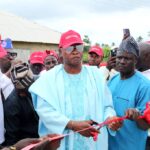By Niniola Odeyemi
Goerge Orwell’s famous quote says all animals are equal, but some are more equal than others. Therefore, just because some animals have four legs doesn’t mean the ones with two legs shouldn’t be able to walk. This quote brings us to the story of Grace Adebanjo’s frustration with her electricity; for over three years, Adebanjo has been paying N206 monthly for what was supposed to be Band A service, and even after the increase, she still paid her electricity bills dutifully, promising at least 20 hours of electricity per day. However, she often received significantly less.
After lodging a formal complaint with the Abuja Electric Distribution Company (AEDC), she discovered she had been misclassified and was a Band B user. Despite this revelation, Adebanjo has yet to receive a refund or adequate compensation for the difference between what she paid for and the service she received. As a current Band B user, Adebanjo says, “we have electricity for about half the day. It’s manageable, but it still doesn’t meet the expectations”. This raises a crucial question: Are consumers genuinely getting what they pay for, or are they being shortchanged by a system failing to deliver its promises?
When consumers sign up for electricity services, they expect a certain level of reliability and consistency based on their tariff band. However, the reality often falls short of these expectations. Many households pay for Band A service, anticipating at least 20 hours of electricity daily, but receivefar less. Some pay for Band E and get nothing. This differenceleaves consumers feeling angry and frustrated. The promise of reliable power becomes a distant dream as they struggle with frequent outages and inconsistent supply.
The issue of misclassification and inadequate service is not unique to Grace Adebanjo. Across Nigeria, many consumers face similar challenges with electricity supply. They often receive inconsistent and unreliable power despite paying for higher service bands. The Nigerian Electricity Regulatory Commission (NERC) quarterly reports frequently mention the challenges of ageing and inadequate infrastructure. For instance, the 2024 first-quarter report states, “The operational performance of the Nigerian Electricity Supply Industry (NESI) continues to be hampered by outdated infrastructure, which limits the efficiency and reliability of electricity supply.” The 2019 first-quarter report highlights that “distribution bottlenecks, including inadequate distribution networks and transformers, contribute to high technical losses and unreliable power supply.” These systemic issues result in frequent power outages and force consumers to rely on expensive alternatives like generators.
Complaining about a problem without posing a solution is called whining. Ensuring that consumers receive the electricity they pay for involves several vital solutions. Accurate and tamper-proof metering is essential to ensure correct billing. Strengthening regulatory frameworks, such as the Service Band Tariff (SBT) guidelines, holds Distribution Companies (DisCos) accountable for delivering the promised level of service. Investing in infrastructure upgrades reduces technical losses and improves reliability. Performance-based incentives for DisCos can motivate better service delivery. Additionally, educating consumers about their rights and how to seek redress effectively empowers them to demand better services.
In a recent interview with The Electricity Hub, Magnus Eminue, a policy analyst at Nextier with experience at the Port Harcourt Electricity Distribution Company and the Emel Group, proposed implementing stringent Service Band Tariff (SBT) guidelines. These measures aim to ensure that Distribution Companies (DisCos) are held accountable for delivering the promised level of service. He highlighted that these guidelines hold Distribution Companies (DisCos) responsible for providing electricity according to their service bands. Suppose a DisCo fails to meet the approved minimum hours of supply. In that case, he stated that its performance will be scrutinised over 60 days, and rates will be adjusted to reflect the quality of service provided. Eminue advises customers facing poor service to draft a formal complaint letter to their DisCo and include the Commission in the correspondence to enhance the chances of a thorough investigation and improvement. Customers can seek redress and contribute to better community service standards by taking these steps.
Eminue highlighted that the solution starts with action for those struggling with poor service. Customers should draft a formal letter to their DisCo detailing their service issues. This letter should then be used to engage in a direct dialogue with the DisCo to seek a resolution. Including the Commission in this correspondence can add weight to the complaint, enhancing the chances of a more thorough investigation and improvement. By taking these steps, customers can seek redress.
While some locations receive the right amount of electricity without hassle, others struggle even after voicing their concerns. What happens then? Should consumers remain silent and endure daily challenges? Should the government give us a permanent solution? Or should NERC implement a more effective structure to ensure fair and consistent service for everyone? There are many questions, yet the answers remain unclear.
(Niniola Odeyemi is a Communications Intern at Nextier’s The Electricity Hub, TEH)



